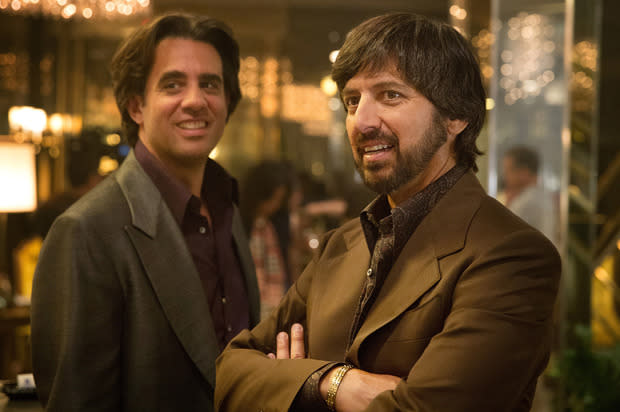'Vinyl' Season Finale Review: Can This Show Be Saved?

Vinyl wrapped up its first season Sunday night on HBO with a spray-painted rave-up that attempted to psych out the viewing audience, to convince us that this series has the sound and vision that will leave us wanting to see next season’s grand plan for the advent of late-1970s punk and disco. The tenth-episode finale was written by the show’s co-creator and show-runner Terence Winter, and was his swan song, since he and HBO have parted ways. Those replacing him have a lot of mop-up work to do.
Beginning to the strains of The Count Five’s “Psychotic Reaction” and ending with the MC5’s “Kick Out the Jams” — in other words, from a great one-hit wonder to a great cult song, neither of which would have actually helped Richie Finestra (Bobby Cannavale) save his record label — the Vinyl episode entitled “Alibi” did a great job of summing up most of what’s been wrong with Vinyl. It managed to extend the show’s organized-crime subplot without giving us any resolution or thrills (you knew that it was Bo Dietl’s Corso who was going to bite the bullet as the only expendable character in that Goodfellas/Casino-ish execution scene). The episode disastrously re-positioned the show’s most interesting character — Ray Romano’s Zak — as a doofus who’s lost his spirit. Oh, and Olivia Wilde’s Devon, one of the few Vinyl supporting players who’s always been intriguing, was nowhere to be seen at all. Instead, there was an increase in soap opera: We were supposed to believe that James Jagger’s Kip would be so heartbroken that Juno Temple’s Jamie would favor the other guy over him in last week’s threesome that he’d risk breaking up the Nasty Bits and, for good measure, overdose in abject self-pity.
Vinyl prides itself on its foreshadowing of the coming trends in the ‘70s, and this episode ladled out irony straining to be hip: the white mail-room guy bleating that “this dance music” — i.e., nascent disco — is the next big thing, and Richie sitting in a bar that’s about to become that crud crucible of Lower East Side punk, CBGB. (I’m really not looking forward to seeing an actor try to mimic the wide-eyed starving-robot moves of David Byrne gulping out the lyrics to Talking Heads’ “Psycho Killer” next season.) For every nice touch — the recreation of the Academy of Music continued to be impeccable — there was a sour note: Am I the only pair of ears that hears early-period Tom Petty, not punk, in the Bits’ “Woman Like You”?
As Vinyl went out with a final scene that found Richie making what seemed like his 18th speech about the youth-inspiring power of rock & roll, and then breaking out a case of spray-paint cans to encourage a room full of inside-the-biz revelers to wreck the offices of American Century/Alibi Records in the spirit of liberating anarchy, you had to wonder: Can this show be saved? Is there a way for a Vinyl that’s not led by Terence Winter, but which is still damp with the nostalgia felt by producers Martin Scorsese and Mick Jagger, to wring itself dry, pull itself together, and become a period drama of some originality?
I truly I hope so. Because just as there was no way I was ever going to miss an episode of the first, extravagantly flawed season of Vinyl, there’s also no way I’ll ever miss watching what HBO and the producers try to do next season to redeem the series. I look forward to Vinyl’s foray into disco: It had better do Donna Summer justice, and I want the show’s new theme music to be permanently changed to the Trammps’ “Disco Inferno.” But if season two is going to use CBGB as its ground-zero, they’d better start their nationwide search for someone to mimic Tom Verlaine playing guitar right now, because that means we’re going to be watching television about Television.

